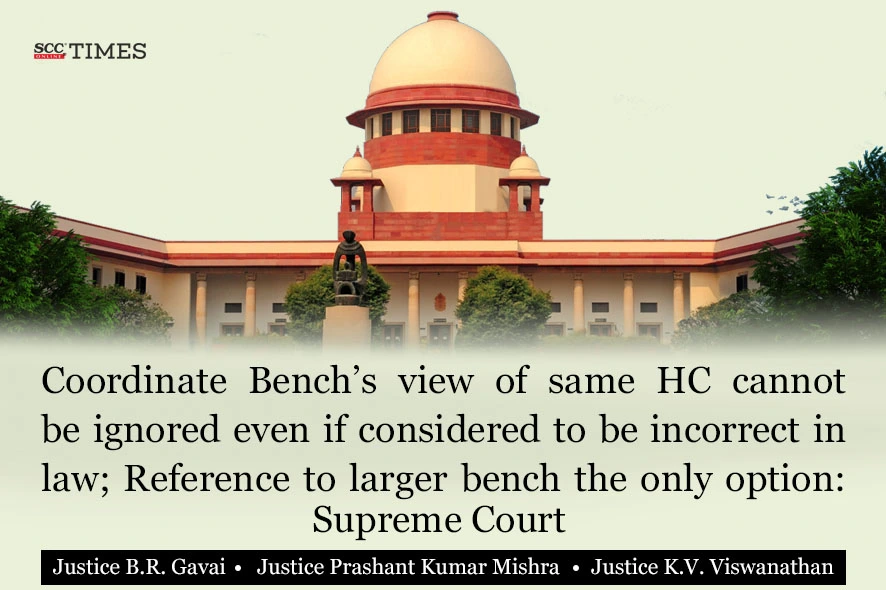Supreme Court: In a criminal appeal against a decision of the Kerala High Court whereby the appellant’s/ detenu’s sister-in-law’s application was dismissed upholding the detention order of the detenus issued under Section 3 of the Conservation of Foreign Exchange & Prevention of Smuggling Activities Act, 1974 (“COFEPOSA”), the three Judge Bench of BR Gavai, Prashant Kumar Mishra and KV Viswanathan, JJ. allowed the appeals and quashed the detention orders along with the order of confirmation of the said detention orders. The Court held that when the Coordinate Bench of the same High Court based on same grounds of detention and on the basis of the same material, which was relied on by the detaining authority, had come to a considered conclusion that non-supply of certain documents had vitiated the right to make an effective representation of the detenus, another Coordinate Bench in the impugned decision could not have ignored the same.
Factual Matrix
In 2021, an unaccompanied baggage of A was seized with contraband gold weighing 14,763.30 grams valued at Rs. 7,16,16,768/-. Statements of co-accused persons were recorded, whereby they admitted that the detenu who was residing in Dubai, UAE, was running a cargo handling and forwarding business and was scouting passengers who had unaccompanied cargo to be sent to India. It was stated that the detenu would send contraband gold concealed in compressors of refrigerators along with unaccompanied baggage. Detention orders under Section 3 of COFEPOSA were issued against the three co-accused persons including father-in-law, brother-in-law of detenu and Customs Cardholder. Subsequently, they challenged their respective detention orders by way of separate Writ Petitions filed before High Court. When detenu returned to India, he was arrested on 05-03-2022 and was served with detention order dated 24-08-2021, and grounds of detention were supplied on 07-03-2022.
The detenu wrote letters to the Director General, Central Economic Intelligence Bureau (‘DG, CEIB’) and Joint Secretary COFEPOSA, seeking various documents that had not been provided to him, including the audio recordings of the voice messages pertaining to the WhatsApp conversations relied upon by the Detaining Authority. The Joint Secretary (COFEPOSA) rejected the request. The Central Government confirmed the detention order of the detenu for a period of one year from the date of detention. On 03-06-2022, the Division Bench of the High Court by a common judgment, allowed the three writ petitions filed by the co-accused persons opining that documents sought had been relied upon in the detention orders and the same ought to have been furnished to the detenus when they requested for the same. Hence, the non-supply had vitally affected the right of the detenus under Article 22(5) of the Constitution of India, therefore, the detention order was bad in law.
The appellant’s challenge to the detention order dated 24-08-2021 along with the confirmation order came to be dismissed by a separate division Bench.
Analysis and Decision
The Court noted that in Nushath Koyamu v. Union of India, 2022 SCC OnLine Ker 2847 relying upon this Court’s decision in State of Bombay v. Atma Ram Shridhar Vaidya, 1951 SCC 43 the Court said that the detaining authority ought to have furnished the materials upon which reliance was placed and refused to accept the authority’s submission that there was no duty to supply the documents to the detenus. In as much as the documents sought has been relied upon in the detention orders, the same ought to have been furnished to the detenus when they requested for the same. Hence, the High Court held that the non-supply has vitally affected the right of the detenus under Article 22(5) of the Constitution of India.
In the matter at hand, the Court noted that the detenu sought copies of the said WhatsApp chats, which were relied upon. However, the Division Bench of the High Court, while rejecting the case of the detenu, said that the detaining authority had arrived at a subjective satisfaction on the basis of various documents and that non-supply of the WhatsApp chats would not vitiate the detention order. Further, the Court noted that, the Division Bench held that the findings of the Coordinate Bench in Nushath Koyamu (supra) were not applicable in the present case.
Referring to Official Liquidator v. Dayanand (2008) 10 SCC 1, wherein it was reiterated that disrespect to the constitutional ethos and breach of discipline have grave impact on the credibility of judicial institution and encourages chance litigation and that every citizen is under a duty to abide by the Constitution and respect its ideals and institutions. Those who have been entrusted with the task of administering the system and operating various constituents of the State and who take oath to act in accordance with the Constitution and uphold the same, have to set an example by exhibiting total commitment to the constitutional ideals, the Court laid down that when the Coordinate Bench of the same High Court based on same grounds of detention and on the basis of the same material, which was relied on by the detaining authority, had come to a considered conclusion that non-supply of certain documents had vitiated the right to make an effective representation of the detenus, another Coordinate Bench could not have ignored the same.
Therefore, the Court held that the Division Bench of the High Court while passing the impugned judgment and order should have followed the view taken by another Division Bench of the same High Court specifically when the grounds of detention and the grounds of challenge were identical in both the cases. In case, the Division Bench of the High Court was of the view that the earlier decision of the Coordinate Bench of the same High Court was not correct in law, the only option available to it was to refer the matter to a larger Bench.
Thus, allowing the appeal the Court quashed and set aside the order of detention dated 24-08-2021 passed by the CEIB, COFEPOSA Wing and the order of confirmation of detention order dated 24-05-2022 passed by the CEIB, COFEPOSA.
CASE DETAILS
|
Citation: Appellants : Respondents : |
Advocates who appeared in this case For Petitioner(s): For Respondent(s): |
CORAM :










